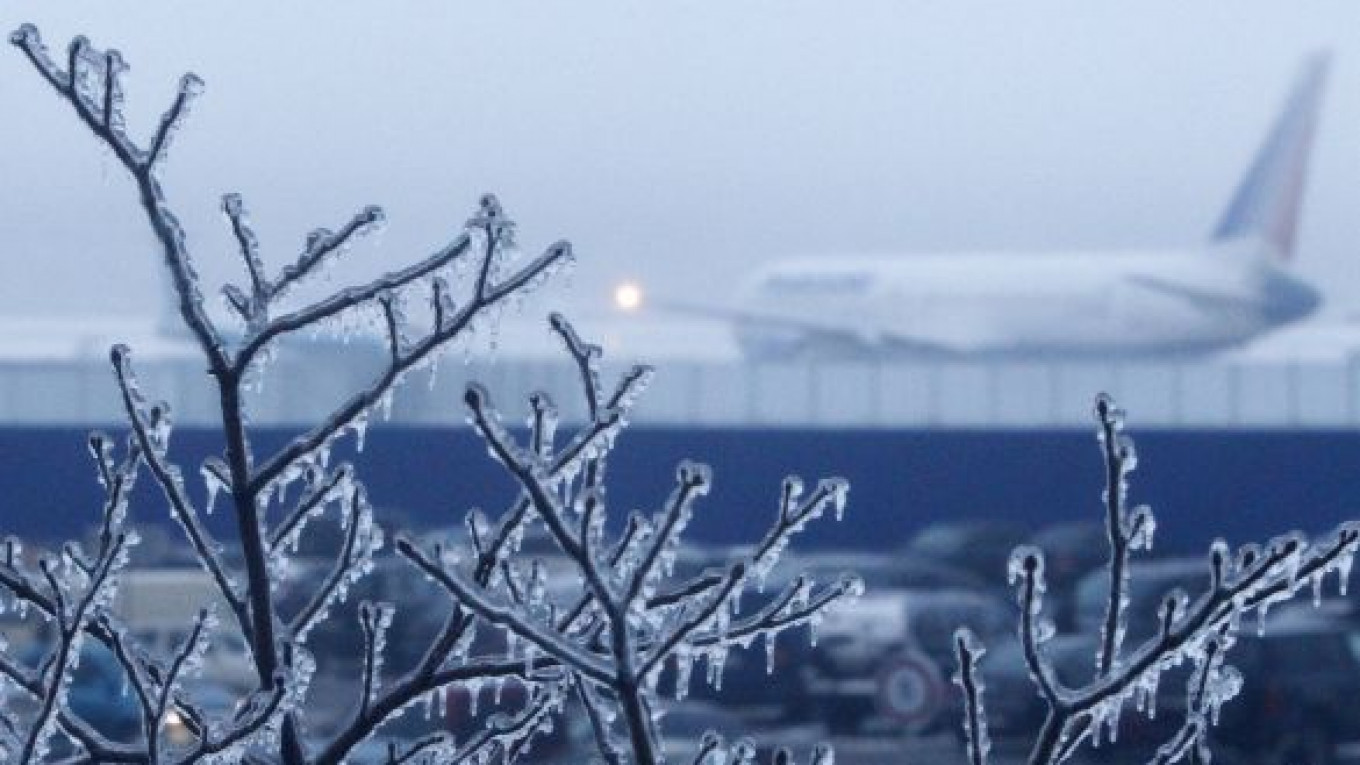An ice storm cut off power to hundreds of towns around Moscow and interrupted travel, causing dozens of injuries by Monday in the country's latest weather-related cataclysm after devastating fires this summer.
The capital has not seen such bad freezing rain since December 1979, Alexei Lyakhov, head of the Moscow weather bureau, told Interfax. A repeat is unlikely for years to come, he said.
Much of the damage was already done by late Friday, when an Atlantic cyclone that approached Moscow earlier that day brought rain that froze as it hit the ground. Temperatures remained several degrees Celsius below zero, according to Meteonovosti.ru, the Moscow weather bureau's web site.
A thick layer of ice covering power lines led to blackouts in more than 500 cities, towns and villages in the Moscow, Smolensk, Tver and Nizhny Novgorod regions that affected 200,000 people in the Moscow region alone, Interfax reported Sunday, citing the Emergency Situations Ministry.
At least one woman died, and though the count of wounded nationwide was not immediately available, Deputy Mayor Pyotr Biryukov said 69 people were injured between Sunday and Monday morning after slipping and falling on the ice-clad city, Interfax reported. At least 44 of them were hospitalized, he said.
The figure may actually be in the hundreds, as an unidentified medical source told Interfax that 1,350 people — twice the average number — sustained injuries on ice-covered streets this weekend.
Another medical source said 27 people, including five children, were injured in Moscow by trees and branches falling under the weight of the ice by Monday morning. Twenty-two, including four children, were hospitalized. ?
Some 150,000 passengers of commuter trains and another 25,000 set to travel on long distance trains were also trapped when power went out on railroads in central Russia on Sunday, Emergency Situations Minister Sergei Shoigu said Monday, Interfax reported.
Schedules for some 110 trains were thrown off because of the December rain, RIA-Novosti reported, citing Russian Railways. Twenty-six diesel locomotives were deployed to Moscow from Bryansk and Smolensk to pull some of the long distance trains that were stuck without electricity, RIA-Novosti said.
In the city, 12 tram and trolleybus routes were halted, and 4,600 trees fell, Mayor Sergei Sobyanin said Monday, Interfax reported.
Traffic jams in Moscow reached a combined length of 3,000 kilometers on Friday, state television Channel One reported Saturday. This is some 500 kilometers more than the distance from Moscow to Tehran or Paris.
Airports also sank into chaos, as dozens of flights being were delayed, and the city's largest air hub, Domodedovo, lost power for 14 hours.
Six out of the country's seven federal districts will see heavy snowfalls and occasional blizzards through Friday, with only the Southern Federal District spared, the Russian Weather Bureau said.
Moscow appeared to have survived the worst, as little snow and minus 4 to minus 10 degrees Celsius are forecast for most of the week, with the exception of Wednesday, when the city will face a blizzard and snow drifts, the weather watchdog said.
Prime Minister Vladimir Putin ordered the Emergency Situations, Transportation and Energy ministries late Sunday "to mobilize all units in order to react swiftly to the events that take place," the government's web site reported.
"Unfortunately, the weather forecast is unfavorable, the situation is expected to worsen, so it is clear that not all depends on us. But all that does depend on us must be done," Putin said.
An army of 100,000 workers and 15,000 vehicles removed 300,000 cubic meters of snow from Moscow streets over the weekend, said Biryukov, the deputy mayor. The city roads are “in satisfactory condition,” he added.
But Sergei Mitrokhin, leader of the liberal opposition Yabloko party and a former City Duma deputy, lambasted communal services for waiting until the afternoon to begin cleaning up the streets on Saturday and Sunday, Interfax reported.
Gennady Onishchenko, head of the Federal Consumer Protection Service, also said not all roads were cleared "in a timely fashion" and called on Muscovites to sue City Hall for injuries sustained on icy streets, Interfax reported.
The bad weather came “as a surprise [for City Hall] despite the fact that Moscow has stayed in the same place for more than 850 years," he said, adding that power cuts "could have been and should have been prevented."
It remained unclear whether the weather would spoil the New Year's festivities in the country. A blizzard in the far eastern city of Petropavlovsk-Kamchatsky destroyed holiday decorations and tangled up 18 meters of lights on the 21-meter New Year's tree downtown, a local official told Interfax on Monday.
A Message from The Moscow Times:
Dear readers,
We are facing unprecedented challenges. Russia's Prosecutor General's Office has designated The Moscow Times as an "undesirable" organization, criminalizing our work and putting our staff at risk of prosecution. This follows our earlier unjust labeling as a "foreign agent."
These actions are direct attempts to silence independent journalism in Russia. The authorities claim our work "discredits the decisions of the Russian leadership." We see things differently: we strive to provide accurate, unbiased reporting on Russia.
We, the journalists of The Moscow Times, refuse to be silenced. But to continue our work, we need your help.
Your support, no matter how small, makes a world of difference. If you can, please support us monthly starting from just $2. It's quick to set up, and every contribution makes a significant impact.
By supporting The Moscow Times, you're defending open, independent journalism in the face of repression. Thank you for standing with us.
Remind me later.


